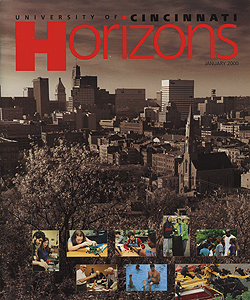by Deborah Rieselman
In fiscal year 1999, the University of Cincinnati received $92.6 million in external research funding, setting a new university record. Because many faculty members receive additional funding through joint ventures with other institutions, such as Children's Hospital Medical Center, administrators estimate that the total actually exceeded $150 million.
"That places us among the top 50 research institutions in the country," President Joseph Steger says, "and the Medical Center ranks among the top 30."
The research emphasis extends throughout campus and through more than two dozen university institutes and centers. The College of Engineering, in particular, has seven research centers investigating everything from air quality to robotics.
Outlining all research topics would be impossible, but the following list provides an interesting mix of research with local and national impact.
- To detect water pollution before it reaches the public drinking supply, UC environmental-health researchers are conducting field tests in Clermont County on genetically mutated zebra fish.
- Finding ways to alleviate overburdened 911 emergency telephone systems is a current study at the Center for Criminal Justice Research, funded with a federal grant.
- Identifying children at risk for lead poisoning was the focus of a recent presentation made to the American Pediatric Association by the Health and Environmental Risk Institute, a collaborative effort among the colleges of engineering, law, arts and sciences, and design, architecture, art and planning.
- Factors that lead to high rates of infant mortality in Cincinnati, such as race, income and education, have been the subject of a study in the School of Planning.
- How to design safer and more productive work sites was highlighted on a CD-ROM published this spring and produced by UC industrial engineers, who worked with ergonomics experts around the world.
- Warning drivers of long delays occured through a messaging system developed by a team of UC engineers in Dayton when a major bridge construction restricted interstate traffic.
- The challenges of health-care delivery in isolated areas around the country was the focus of three planning students who won summer fellowships in '97 through the National Rural Health Association, which awarded no other university in the country more than one fellowship.
- Gender inequity in labor markets and households, the effect of work place subordination on men's avoidance of housework and how work and family roles affect health and health-care access are a few studies from The Kunz Center for the Study of Work and Family in the Department of Sociology.
- Studying national patterns in crime, drug use, elections, population, labor, family growth and hospital discharges are topics recently undertaken by the Institute for Policy Research.
- Students collecting and sharing data through a novel computer network designed by UC chemists and installed at Walnut Hills High School's new science building. It is likely to serve as a model for school laboratories across the nation.

 Past Issues
Past Issues